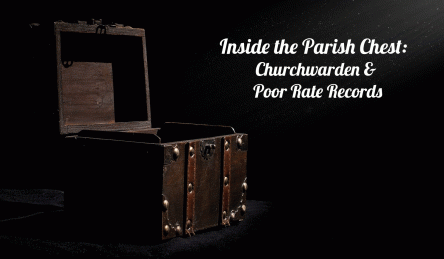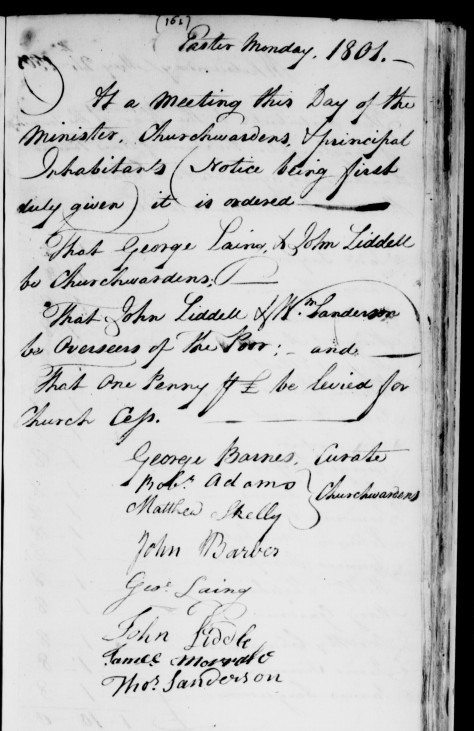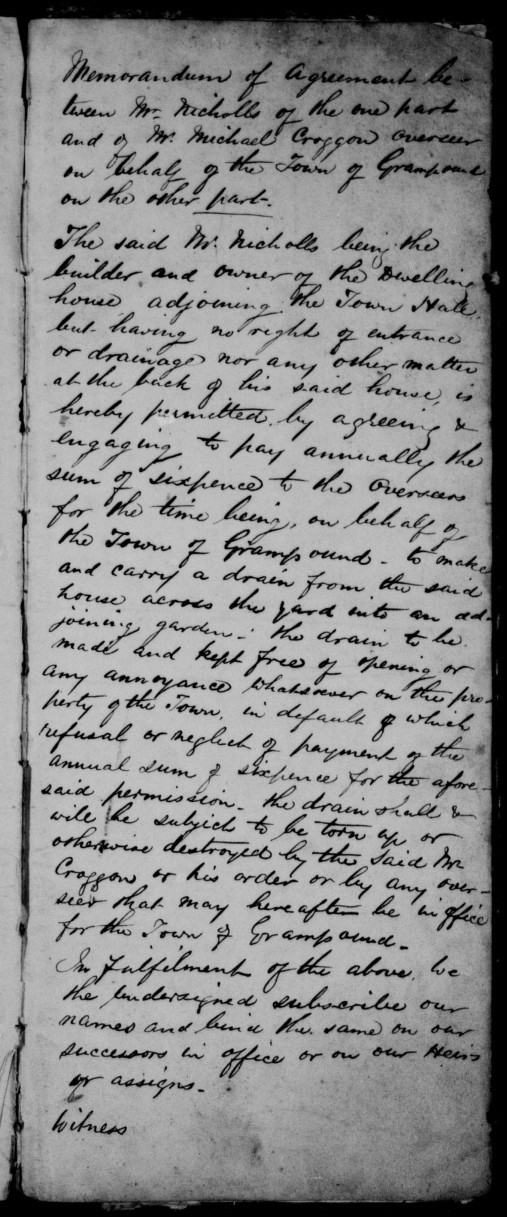 In the Parish Chest – Churchwarden and Poor Rate Records is the fourth and final post of the In the Parish Chest series. The other posts discussed Bastardy Bonds, Settlement Certificates, Examinations and Removal Orders and Apprenticeship records.
In the Parish Chest – Churchwarden and Poor Rate Records is the fourth and final post of the In the Parish Chest series. The other posts discussed Bastardy Bonds, Settlement Certificates, Examinations and Removal Orders and Apprenticeship records.
As early as 1572, Overseers of the Poor were appointed in each parish in England. Their job consisted of caring for the poor and keeping an account of the relief given. The Poor Law Act of 1601 gave Overseers the right to collect a poor rate from members of the parish who were considered wealthy and to disburse those funds to those needing help.
Churchwardens were expected to present any wrongdoings in the parish to the local magistrate or bishop. This would include such things as drunkenness, failure to provide for the poor or to attend church. Those serving as Churchwardens and Overseers of the Poor are mentioned by name in the records.
By 1834, when the Poor Law Amendment Act came into being, parishes were grouped into Unions. A Board of Guardians was elected and were responsible for the care of the poor across all the individual parishes. It is through these Poor Laws that our ancestors received help. Often money would be given out but the relief also consisted of providing food, clothing and work.
Who will you find named in the Churchwarden/Poor Rate Records?
- Your ancestor if he/she was poor, elderly, orphaned, unemployed, sick or a trouble maker
- Your ancestor if he was elected a Churchwarden or Overseer of the Poor.
- Your ancestor if he/she was considered wealthy and was a rate payer
Examples of Poor Law records
Churchwarden Accounts – Muggleswick, County Durham.1
On Easter Monday of 1801, the inhabitants of the parish of Muggleswick, Durham, met together to elect the new Churchwardens and Overseers of the Poor. This is a common entry in all Churchwarden accounts, followed by an accounting of the disbursement of funds to the poor. The outgoing and incoming Churchwardens were named as were the new Overseers and other principal inhabitants of the parish.

Overseers of the Poor Account Book – Helland, Cornwall.2
Thomas Pearce and William Brior were Overseers of the Poor in the parish of Helland, Cornwall in the year 1766 to 1767. The page below shows an account of what was paid out that year. Included among the items like a pair of shoes or meat are the names of some members of the parish who received help.
 Overseers of the Poor – Grampound, Cornwall.3
Overseers of the Poor – Grampound, Cornwall.3
If a person wanted to improve their property in a way which may affect the town or parish, there would have to be an agreement made between them and the Overseers of the parish. In the document below, Mr. Nicholls and Mr. Michael Croggon, Overseer of the Parish of Grampound, Cornwall, have come to an agreement regarding Mr. Nicholls request to build a drain that would go from his dwelling across town property to another garden. The request is approved subject to Mr. Nicholls paying sixpence annually to the Overseers and keeping the drain free of “any annoyance whatsoever on the property of the Town, in default of which refusal or neglect of payment of the annual sum…the drain shall and will be subject to be torn up or otherwise destroyed.” If Mr. Nicholls was your ancestor you have just been given a glimpse into his life!

Relief Committee minute books 1832-1851, Norwich, Norfolk Poor Law Union.
On 6 October 1801, John Mordy of Saint Peter of Mancroft paid twelve pounds to the Poor Law Union, being his responsibility for the “female bastard child” of Susanna Baxter. He had previously been charged with a Bastardy Bond and this is the record of him settling that responsibility.4 More information on Bastardy Bonds can be found here.

On the same day, the Mayor’s request for an arrest warrant for John Malster was granted. John had left his wife and family without support and they were now relying on the parish.5

Orders for placing young boys in apprenticeships were common in these Poor Law records. Below, James Berry, 14-years old, was being apprenticed to Richard Cropley, a cordwainer, until he reached the age of 21. More on apprenticeship records can be found here.6

Details of daily life are reflected in the Poor Law records. Most of these records are not indexed so it helps to have an idea of which parish your ancestor lived in. However, even if you don’t know exactly where they may have lived, reading through the Poor Law records of any parish will give you valuable insight into what life was like in the parishes of England during this time period.
- Durham, Muggleswick, Parish chest records, Churchwardens Accounts, 1801-1858, Easter Monday 1801; digital image, FamilySearch (https://www.familysearch.org/ark:/61903/3:1:939N-F43C-SK?i=5&cat=978581 : accessed 11 September 2018), citing Family History film 004024471, image 6 of 1114. ↩
- Cornwall, Helland, Poor law records, 1753-1851, Easter 1766; digital image, FamilySearch (https://www.familysearch.org/ark:/61903/3:1:S3HY-61PP-GN?cat=502005 : accessed 11 September 2018), citing Family History film 004476779, image 1295 of 1679. ↩
- Cornwall, Grampound, Poor law records, 1671-1894, agreement between Mr. Nicholls and Mr. Croggon; digital image, FamilySearch (https://www.familysearch.org/ark:/61903/3:1:S3HY-61PL-NT?cat=502005 : accessed 11 September 2018), citing Family History film 004476779, image 993 of 1679. ↩
- Norfolk, Norwich, Poor Law Union Records, 1796-1900, Guardians’ minute books, 6 October 1801, John Mordy; digital image, FamilySearch (https://www.familysearch.org/ark:/61903/3:1:S3HT-D1DH-8S7?i=2228&cc=1824706&cat=495724 : accessed 12 September 2018), image 2229 of 3866; citing Norwich Record Office. ↩
- Norfolk, Norwich, Poor Law Union Records, 1796-1900, Guardians’ minute books, 6 October 1801, warrant for John Malster; digital image, FamilySearch (https://www.familysearch.org/ark:/61903/3:1:S3HT-D1DH-8S7?i=2228&cc=1824706&cat=495724 : accessed 12 September 2018), image 2229 of 3866; citing Norwich Record Office. ↩
- Norfolk, Norwich, Poor Law Union Records, 1796-1900, Guardians’ minute books, 6 October 1801, apprenticeship of James Berry ; digital image, FamilySearch (https://www.familysearch.org/ark:/61903/3:1:S3HT-D1DH-8G4?i=2229&cc=1824706&cat=495724 : accessed 12 September 2018), image 2230 of 3866; citing Norwich Record Office. ↩


I am loving this series and have included a link in my Always Interesting segment under General Interest in Friday Fossicking at
http://thatmomentintime-crissouli.blogspot.com/2018/09/friday-fossicking-14th-sept-2018.html
Thank you. Chris
LikeLiked by 2 people
Thanks, Chris! Appreciate that!
LikeLiked by 1 person
You’re welcome…
LikeLike
A great article – thank you. I am in Scotland, and the Kirk Session records give us similar information which often can be summarized as giving “censure to the sinful and charity to the poor”. My local archive centre in the Scottish Borders has a brilliant collection of very detailed, personal poor law records which are a must if you find your ancestor described as a “pauper” in a census return.
LikeLiked by 1 person
I have Scottish ancestors who have been hiding from me for quite a while now! I definitely need to check out the Kirk Session records, perhaps I’ll be lucky and find them there! Thanks for stopping by, Susan.
LikeLike
Thanks for explaining such a wonderful resource! Before they came to the USA, my English ancestors were pretty poor, and one of my ancestors was born out of wedlock. I now have new resources where I can search for them! Thanks!
LikeLiked by 2 people
Hi EvaAnne, so glad I could help in finding some new resources for you to look through. With having an ancestor born out of wedlock, you may get really lucky and find them in Bastardy Bond records. I have an earlier post on those records. Good luck and thanks for stopping by!
LikeLiked by 1 person
I assume there must be comparable records in the US? I need to do some digging. Now that I think about it, my dad had a parish discretionary fund, and he kept a ledger of what he spent. I seriously doubt those records survived.
LikeLiked by 1 person
Liz, there are a good number of Overseers of the Poor records for the US on FamilySearch (some available online, some viewable at a family history center. If you search the Catalog with the keywords ‘overseers of the poor united states’, you’ll get a list which includes records in Virginia, West Virginia, New Jersey, New York, Pennsylvania, Massachusetts, etc.
LikeLiked by 1 person
Thank you for the information! There is so much to explore; new worlds keep opening up every day. Reading blogs such as yours has been so helpful in learning to see the worlds inherent in records. Amazing!
LikeLiked by 1 person
Always amazed at the amount of information that is out there for us to find. Great post!
LikeLiked by 2 people
I agree, these parish chest records are just full of great information! Thanks for stopping by!
LikeLiked by 2 people